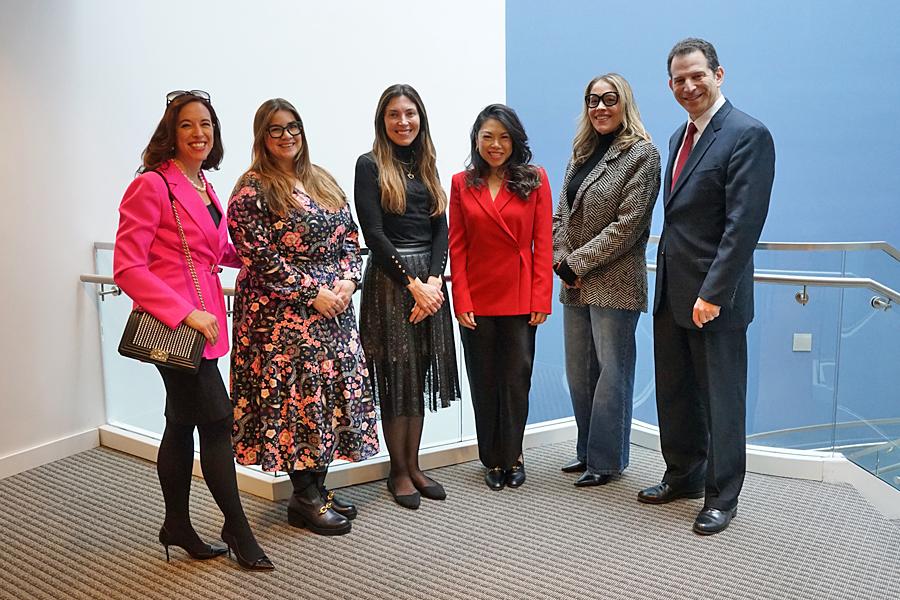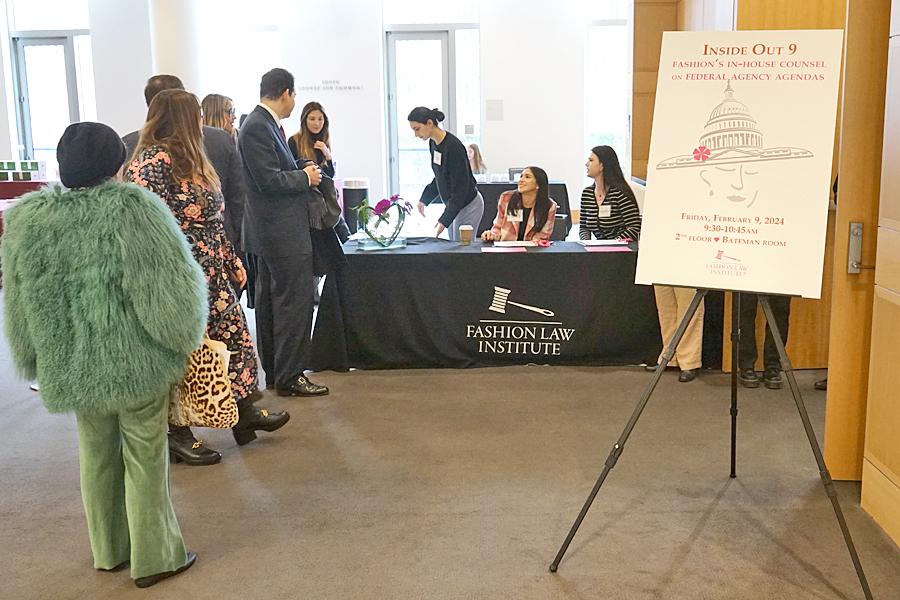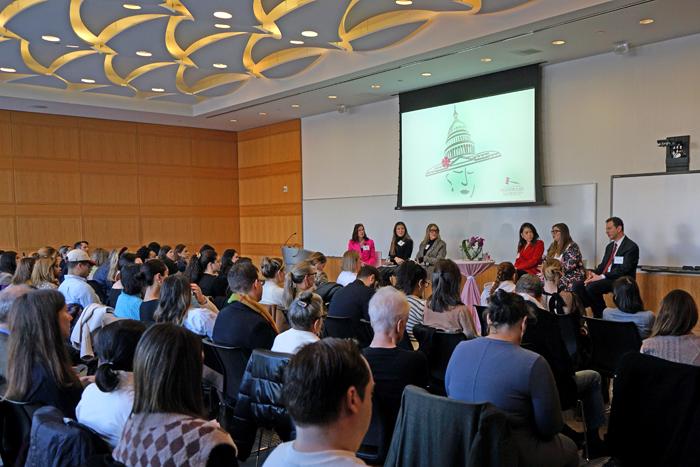
Panel standing (L to R, Susan Scafidi, Fashion Law Institute at Fordham; Ashley Valdes, Warby Parker; Ewa Abrams, Kering; Alice Pang, Ralph Lauren; Hayley Macon, Endeavor; Jeffrey Hellman, PVH) – All Photos courtesy Fashion Law
In this highly charged political environment with clown-world-level news dropping every minute, is it even possible to have a panel discussion about US federal agencies in Washington without mentioning the current White House resident, the former president, or amendments 25 or 14? Why, yes, Virginia (neighboring state, pun intended), it is!

Check-In
I witnessed this discussion Friday at Fashion Law Institute’s annual NYFW panel featuring six in-house counsel members at various fashion companies or brands. As usual, this meeting was off the record. Therefore, I will not be attributing quotes to their speakers. Thank you to the Fashion Law Institute for allowing me access.
Professor Susan Scafidi, founder and director of Fashion Law Institute, actually hails from DC – a town “routinely derided as the city of Southern efficiency and Northern charm” where federal agencies such as the Copyright Office, the Department of Labor (DOL), the SEC and of course the FTC (Prof. Scafidi almost named this seminar “wtFTC?”), have been busy lately with new proposals and regulations directly affecting the fashion industry.
Panelists included Ewa Abrams, General Counsel, Kering Americas; Hayley Macon, Senior Vice President and Associate General Counsel, Endeavor; Alice Pang, Lead Intellectual Property Counsel, Ralph Lauren; Ashley Valdes, Assistant General Counsel, Warby Parker; and a lone male — Jeffrey Hellman, Senior Vice President and Assistant General Counsel, PVH Corp. Prof. Scafidi, welcoming as a ray of sunshine in her eye-opening Brandon Maxwell neon “Barbie” blazer, served as moderator.

Audience
First on the agenda was a victory lap for Chanel on a win this week after a six-year battle in the trademark case against retailer “What Goes Around Comes Around” (WGACA). The case addressed trademark infringement and unfair competition based on a false association; trademark infringement found on the sale of infringing Chanel branded products and use of various hashtags; sale of counterfeit Chanel branded products; and false advertising — with WGACA ordered to pay $4 million in damages. WGACA insists there’s more to come in post-verdict motions, so stay tuned.
“From a fraud perspective, it’s extremely interesting,” said a panelist, “in expanding the definition of counterfeit and the scope of what a counterfeit is in parallel (or “gray market” goods) as well as items not authorized for sale.” This would include branded items on display in the Chanel boutiques, such as display pieces, vanity trays, or tissue boxes “Not your typical Canal Street counterfeits,” added Prof. Scafidi.
Since the reselling of designer luxury goods on the secondary market (eBay was the first and now higher-end platforms such as Vestiaire Collective and The RealReal — also sued by Chanel in a bellwether case) has taken off for multiple reasons – sustainability and reduced cost being two major parts of this equation — the great challenge arises to police and authenticate these goods.
Vestiaire supposedly employs several marketing tools to reinforce its product, including lifetime repair guarantees. I know from experience that Chanel was or is very sticky about not repairing anything older than two years.
“Only Chanel can authenticate Chanel; sometimes even their teams can’t do it. Items like shoes don’t have a serial number to reference,” said a panelist. “It’s in the brands’ interest to ensure authenticity to avoid brand dilution.”
Regarding the Federal Trade Commission (FTC), one panelist remarked on their “extraordinarily broad powers to create and enforce rules.” The Sherman Act of 1890 is still the “meat and potatoes” law regarding unfair and deceptive trade packages, competition, and consumer protection.
Commissioner Lina Khan, the current chairwoman of the FTC, is a “progressive at the formerly sleepy agency not formerly known for pushing boundaries.” They are paying close attention to social media endorsements with Section 5 of the FTC act enacted last June and can now apply penalties to rules regarding tagging and disclosures between advertisers and talent – tags, and compensation needs to be disclosed clearly and not in a click-through message.
Another panelist spoke of the FTC’s Green Guides dealing with environmental issues of reducing waste, what is considered “clean,” carbon emissions offsets — often “down to how employees commute to work,” and a whole host of items that have not been updated since 2012. Not only are these nearly impossible to comply with, but they need to be more precise, and the laws need to be rewritten.
The topic of AI (Artificial Intelligence) is vast and deserves its own panel. Still in its infancy, knowing how to control it legally is impossible. As far as the formerly sleepy-now-wide-awake Copyright Office is concerned, images created solely by prompts on a computer produced using AI cannot be copyrighted. “A copyright belongs to an author, not a non-human,” said a panelist who mentioned the famous “monkey selfie” case.
“The Copyright office doesn’t know how to handle these cases or have the manpower. There’s a lot of policy concerns – deep fakes are an issue. How do we harness this power for good? AI is just another thing like 3-D printing – we don’t even understand it in fashion; how can the copyright office?” There is one way, though – while human authorship on top of a created image is not subject to copyright, you can claim rights if you develop an image or design first and then use AI to tweak it.” We’re waiting in the void, figuring out where we’re going with AI.”
I’d say that applies to everything coming out of Washington these days…
Latest Comments:
The MAD About Jewelry benefit looks like a stunning event—so much talent on display!
Love the deep dive into timeless fashion trends!

Our comments section is working again…

LOVE all of this. Thank you, Marilyn. <3

My fave is the Gorski. Best look and function to me!

A Marvelous Tribute to IRIS, a one-of-a-kind work of art!

You beautifully, tastefully, and rightfully said it all. I do think Melania’s Adviser Herve Pierre influences her choices.

Fascinating article–fascinating man! Thanks, Marilyn!

Love my portrait Thank you Michel Haddi!!!!
Such a fun and bold take on fashion! Love how this collection brings a fresh, playful energy to the scene.

Beautifully written with fashion, identity, and branding intelligence!

Wonderful gift ideas for stressful times! These suggestions are really thoughtful. Thanks for sharing!

Bob Mackie…truly a creative GENIUS with limitless talent that I adore!

I have loved Carol, her work and everything she’s done since 1975. ~ Paul Ruscha’
The *MAD About Jewelry* event at the Museum of Arts & Design celebrated the vibrant world of contemporary, artist-made jewelry.…

The article highlights 12 standout fall fashion pieces, ranging from luxurious vintage items to contemporary designs. With eclectic finds like…

Iris Apfel’s 100th birthday looked like the ultimate celebration—so iconic!